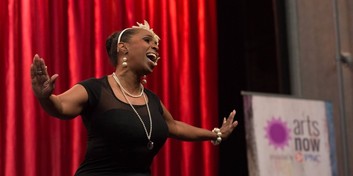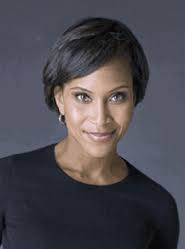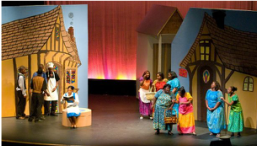Porgy and Bess premiered in 1935 and it is considered to be America’s first great opera. It will be presented by the NC Opera on April 14 and 16, 2023. According to Kenneth Overton, who has the role of Porgy, “Porgy and Bess has incredible music, and it's a story that has all the elements of great theatre, love, triumph over adversity, death, dance, and comedy.”
George Gershwin, a Jewish American composer, traveled to South Carolina to gain inspiration to develop Porgy and Bess. At a time when white performers wore black face to perform African American roles, Gershwin required all Porgy and Bess cast members to be of African descent. This decision was controversial, but it opened doors for African American performers and audiences that continues to this day.
Porgy and Bess has provided opportunities for African American singers who often have difficulty finding lead roles in opera. Porgy ang Bess has helped many performers to establish their careers. Cast members are often able to travel around the world with this outstanding opera. In addition, as a part of a large African American cast they can develop important relationships with other Black performers.
Overton said, “I have met lifelong friends from doing this opera. It has also taken me to several places both domestically and internationally. It doesn't come without its challenges, but it has been worth it.”
In 1954, Maya Angela turned down a principal role in a Broadway show, to take a small part in a 22-nation tour of Porgy and Bess. Dr. Angelou, reflected about her experience in a 2010 interview. “(It was) a chance to see places I ordinarily would never see, I only dreamed of in the little village in Arkansas in which I grew up.” Maya also noted that the cast was full of classically trained singers who had limited opportunities to perform, and they became a close-knit group.
Porgy and Bess has also had a significant impact on audiences. As it toured throughout the U.S. some venues, like the National Theatre in Washington, DC were integrated because of protests from cast members. Overton commented, “For many years, Porgy and Bess was the only opportunity where seeing African Americans in other standard opera roles would also increase visibility on and off stage. People go where they feel welcomed and safe.”
When Maya Angelou first saw Porgy and Bess, she had a powerful response. “I remained in my seat after the curtain fell and allowed people to climbed over my knees to reach the aisle. I was stunned. Porgy and Bess had shown me the greatest array of Negro talent I had ever seen.”’
Don't miss your opportunity to see an amazing production of Porgy and Bess! For more information or to buy tickets, just go to www.ncopera.org.
George Gershwin, a Jewish American composer, traveled to South Carolina to gain inspiration to develop Porgy and Bess. At a time when white performers wore black face to perform African American roles, Gershwin required all Porgy and Bess cast members to be of African descent. This decision was controversial, but it opened doors for African American performers and audiences that continues to this day.
Porgy and Bess has provided opportunities for African American singers who often have difficulty finding lead roles in opera. Porgy ang Bess has helped many performers to establish their careers. Cast members are often able to travel around the world with this outstanding opera. In addition, as a part of a large African American cast they can develop important relationships with other Black performers.
Overton said, “I have met lifelong friends from doing this opera. It has also taken me to several places both domestically and internationally. It doesn't come without its challenges, but it has been worth it.”
In 1954, Maya Angela turned down a principal role in a Broadway show, to take a small part in a 22-nation tour of Porgy and Bess. Dr. Angelou, reflected about her experience in a 2010 interview. “(It was) a chance to see places I ordinarily would never see, I only dreamed of in the little village in Arkansas in which I grew up.” Maya also noted that the cast was full of classically trained singers who had limited opportunities to perform, and they became a close-knit group.
Porgy and Bess has also had a significant impact on audiences. As it toured throughout the U.S. some venues, like the National Theatre in Washington, DC were integrated because of protests from cast members. Overton commented, “For many years, Porgy and Bess was the only opportunity where seeing African Americans in other standard opera roles would also increase visibility on and off stage. People go where they feel welcomed and safe.”
When Maya Angelou first saw Porgy and Bess, she had a powerful response. “I remained in my seat after the curtain fell and allowed people to climbed over my knees to reach the aisle. I was stunned. Porgy and Bess had shown me the greatest array of Negro talent I had ever seen.”’
Don't miss your opportunity to see an amazing production of Porgy and Bess! For more information or to buy tickets, just go to www.ncopera.org.



 RSS Feed
RSS Feed